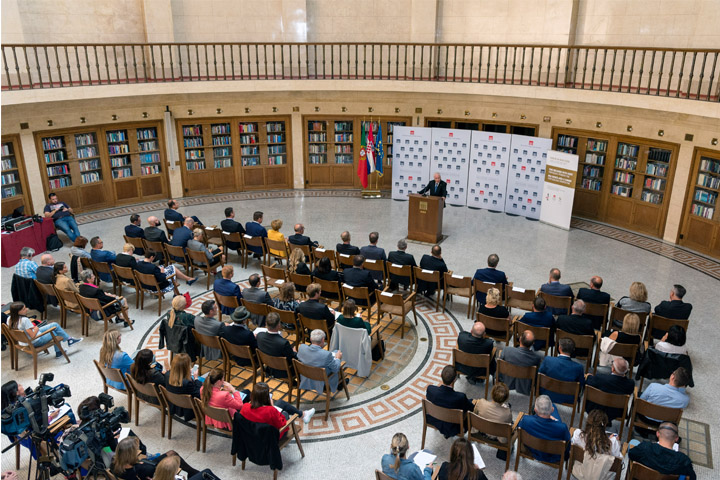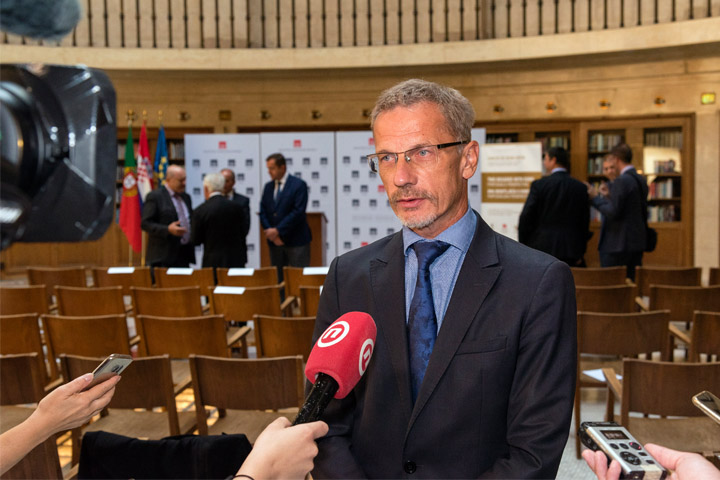
Governor Carlos da Silva Costa held a presentation on Portugal's twenty years of euro experience
The experiences of other euro area member states with the euro as the official currency are important to Croatia, in particular in the light of Croatia’s efforts to join the Exchange Rate Mechanism (ERM II) and the subsequent adoption of the euro as the country's official currency, Governor Boris Vujčić said in his opening speech to the visiting lecture given by the Governor of the Portuguese central bank, Carlos da Silva Costa, on 20 September at the Croatian National Bank.
We will continue with this practice in the forthcoming period and invite other central bank governors from the euro area in order to learn from their euro experience and find out what Croatia can expect in the euro area, Vujčić said and mentioned that in July 2019 Croatia had sent a letter to the competent institutions of the European Union and member states expressing the country's intention to participate in the ERM II, including an overview of the obligations to be fulfilled before joining the ERM II. At the Eurogroup meeting held in July, EU institutions and member states welcomed Croatia's intention and commitment to carry out the necessary adjustments to prepare for the participation in the ERM II. If all goes according to plan, Croatia might join the ERM II, the SSM (Single Supervisory Mechanism) and the SRM (Single Resolution Mechanism) next year.

As one of the euro area founding member states, Portugal prepared for the adoption of the euro under different circumstances than Croatia. For the EU as a whole, the creation of a single currency 20 years ago was the crucial moment in the history of European integration. Although a lot has been done so far, in particular in the period after the last financial crisis – which led to changes in the rules and the architecture of the Economic and Monetary Union (EMU) – still there are weaknesses and deficiencies which should be addressed within the EMU, said Governor da Silva Costa.
History has taught us that the imbalances in Portugal have been caused by a combination of excessive borrowing and weak potential growth. Also, easy access to loans and the insufficient quality of institutions and policies limited potential growth, he added.
Macroeconomic imbalances led to the exceptional vulnerability of the Portuguese economy to the international financial crisis, which resulted in Portugal's inability of autonomous financing in foreign financial markets and consequently in concluding the economic and financial assistance programme between the Portuguese authorities, the EU and the IMF.
The Governor also mentioned that monetary policy is not a solution for structural problems – it can ensure a favourable environment for growth and financial and nominal stability. Although exchange rate stability or the single currency are important for creating favourable conditions for the optimisation of economic growth, they are not critical factors. The quality of policies and institutions and the way in which resources are distributed in the economy are important. Speaking about the quality of economic policies, he said that countries need social consensus in issues such as demographic evolution, social security system and increasing productivity.
Blame should not be placed on the common currency, the euro, for the problems the individual EU member states were faced with because of the recent financial crisis. After Portugal’s accession to the euro area, the price of loans fell, which led to an increase in borrowing, but the fact that Portugal is part of the euro area facilitated the resolution of the country's debt crisis through cheaper financing and with the assistance of the EU countries.
Zvonimir Savić, Special Advisor to the Croatian Prime Minister on Economic Issues and Darko Horvat, Minister of Economy, Entrepreneurship and Crafts were among many distinguished guests who attended the gathering.
Banco de Portugal’s Governor Carlos da Silva Costa is an acknowledged expert with extensive experience in finance and diplomacy. At the beginning of his career in 1978, he joined Banco Português do Atlântico, where he soon became Head of the Research Department. From 1986 to 1992, da Silva Costa was Coordinator of the Economic and Financial Affairs Department in the Portuguese Permanent Representation to the European Union and from 1993 to 1999, he served as Head of Cabinet of a Portuguese European Commissioner. In 2000, da Silva Costa returned to commercial banking, holding the leading positions at some of the largest Portuguese banks during the following several years. Before the appointment as Governor of Banco de Portugal in 2010, he was Vice-President of the European Investment Bank (EIB), with responsibility for EIB funding in Portugal, Belgium, Spain, Luxembourg, Latin America and Asia. He also pursued a successful academic career. Carlos da Silva Costa is currently Visiting Full Professor at the Portuguese Catholic University of Oporto and at the University of Aveiro.
